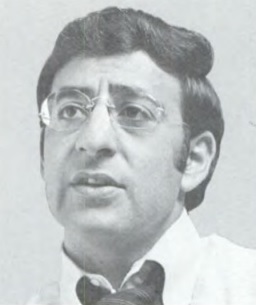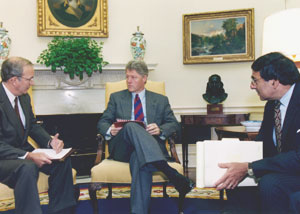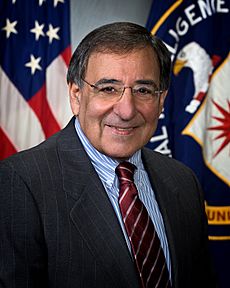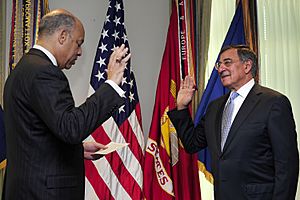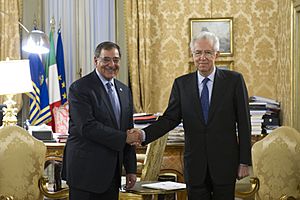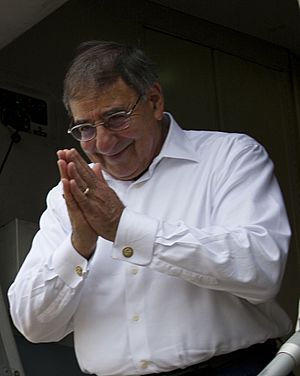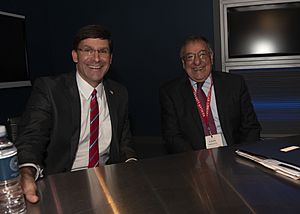Leon Panetta facts for kids
Quick facts for kids
Leon Panetta
|
|
|---|---|
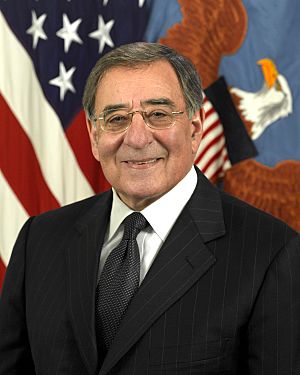
Official portrait, 2011
|
|
| 23rd United States Secretary of Defense | |
| In office July 1, 2011 – February 26, 2013 |
|
| President | Barack Obama |
| Deputy | William J. Lynn III Ash Carter |
| Preceded by | Robert Gates |
| Succeeded by | Chuck Hagel |
| 3rd Director of the Central Intelligence Agency | |
| In office February 13, 2009 – June 30, 2011 |
|
| President | Barack Obama |
| Deputy | Stephen Kappes Michael Morell |
| Preceded by | Michael Hayden |
| Succeeded by | David Petraeus |
| 18th White House Chief of Staff | |
| In office July 17, 1994 – January 20, 1997 |
|
| President | Bill Clinton |
| Preceded by | Mack McLarty |
| Succeeded by | Erskine Bowles |
| 29th Director of the Office of Management and Budget | |
| In office January 21, 1993 – July 17, 1994 |
|
| President | Bill Clinton |
| Preceded by | Richard Darman |
| Succeeded by | Alice Rivlin |
| Chair of the House Budget Committee | |
| In office January 3, 1989 – January 21, 1993 |
|
| Preceded by | William H. Gray |
| Succeeded by | Martin Olav Sabo |
| Member of the U.S. House of Representatives from California |
|
| In office January 3, 1977 – January 21, 1993 |
|
| Preceded by | Burt Talcott |
| Succeeded by | Sam Farr |
| Constituency | 16th district (1977–1993) 17th district (1993) |
| Personal details | |
| Born |
Leon Edward Panetta
June 28, 1938 Monterey, California, U.S. |
| Political party | Democratic (1971–present) |
| Other political affiliations |
Republican (before 1971) |
| Spouse | Sylvia Varni |
| Children | 3, including Jimmy |
| Education | Santa Clara University (BA, JD) |
| Signature | |
| Military service | |
| Allegiance | United States |
| Branch/service | United States Army |
| Years of service | 1964–1966 |
| Rank | First Lieutenant |
| Awards | Army Commendation Medal |
Leon Edward Panetta (born June 28, 1938) is an American politician and government official who is now retired. He has held many important jobs in the United States government. These include being the Secretary of Defense (from 2011 to 2013) and the Director of the CIA (from 2009 to 2011).
Panetta also served as the White House Chief of Staff (from 1994 to 1997) and director of the Office of Management and Budget (from 1993 to 1994). Before that, he was a U.S. representative for California in Congress (from 1977 to 1993). After his time in government, he helped start the Panetta Institute for Public Policy. He also taught public policy at Santa Clara University.
In 2009, President Barack Obama chose Panetta to lead the Central Intelligence Agency (CIA). The Senate approved him in February 2009. As CIA Director, Panetta was in charge when the operation to find and kill Osama bin Laden happened. In 2011, President Obama nominated Panetta to be the Secretary of Defense. The Senate approved him, and he started this new role on July 1, 2011.
Since leaving his role as Defense Secretary in 2013, Panetta has been the chairman of the Panetta Institute for Public Policy. This institute is located at California State University, Monterey Bay. He helped create this university campus when he was a congressman. The institute helps prepare people for public service and encourages them to be involved in democracy. Panetta also writes and speaks often about important public policy issues. His son, Jimmy Panetta, has served in the U.S. House of Representatives since 2017, holding his father's former seat.
Contents
- Early Life and Education
- Military Service
- Political Career
- Other Activities
- Later Career (2013–present)
- Personal Life
- Awards and Honors
- Images for kids
- See also
Early Life and Education
Leon Panetta was born in Monterey, California. His parents, Carmelina and Carmelo Panetta, were Italian immigrants from Siderno, Italy. In the 1940s, his family owned a restaurant in Monterey.
He grew up in the Monterey area and went to Catholic grammar schools. He attended Monterey High School, where he was active in student government. He was vice president of his student body as a junior and president as a senior. In 1956, he went to Santa Clara University. He graduated with high honors in 1960 with a degree in political science. In 1963, he earned a law degree from the Santa Clara University School of Law.
Military Service
In 1964, Panetta joined the United States Army as a second lieutenant. He served in the Army Military Intelligence Corps. He received the Army Commendation Medal for his service. In 1966, he left the Army as a first lieutenant.
Political Career
Starting in Politics
Panetta began his political career in 1966. He worked as an assistant for Republican Senator Thomas Kuchel from California. Panetta saw Senator Kuchel as a great role model.
In 1969, Panetta became an assistant to Robert H. Finch. Finch was the Secretary of Health, Education, and Welfare under President Richard Nixon. Panetta was then made director of the Office for Civil Rights.
Panetta worked to enforce civil rights and equal education laws. He did this even though President Nixon wanted to slow down these efforts. Panetta left his job in 1970 and worked for John Lindsay, the mayor of New York City. He later wrote a book about his experiences. From 1971 to 1976, he practiced law in Monterey.
Serving in Congress
Becoming a Representative
In 1971, Panetta changed his political party to the Democratic Party. He felt the Republican Party was moving too far from the middle. In 1976, he was elected to the U.S. Congress. He represented California's 16th congressional district. He won this election and was reelected eight more times.
Key Work in Congress
While in Congress, Panetta focused on several important issues. These included budget matters, civil rights, education, and healthcare. He also worked on agriculture, immigration, and protecting the environment. He was especially interested in stopping oil drilling off the California coast.
He helped create the Monterey Bay National Marine Sanctuary. He also worked to provide Medicare coverage for hospice care. Panetta was important in establishing California State University, Monterey Bay. This university was built at the former Fort Ord military base.
Budget Committee Role
Panetta was a member of the House Committee on the Budget from 1979 to 1989. He then became its chairman from 1989 to 1993. He played a big part in the 1990 budget agreement.
Leading the Office of Management and Budget
Even though he was elected for a ninth term in Congress in 1992, Panetta left the House in 1993. President-elect Bill Clinton chose him to be the director of the United States Office of Management and Budget. In this role, he helped create the budget plan that led to a balanced budget in 1998.
White House Chief of Staff
In 1994, President Clinton asked Panetta to become his new White House Chief of Staff. This job involves managing the White House staff and helping the president with daily tasks. Panetta held this position from July 17, 1994, to January 20, 1997. He was a key person in negotiating the 1996 budget, which also helped balance the national budget.
Director of the CIA
Becoming CIA Director
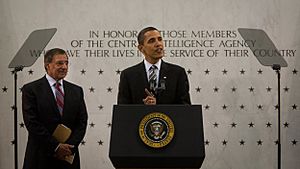
On January 5, 2009, President-elect Barack Obama announced he wanted Panetta to lead the Central Intelligence Agency (CIA). Some people wondered about Panetta's experience in intelligence. However, others pointed out his close connection to the president and his past work reviewing intelligence programs.
On February 12, 2009, the Senate approved Panetta's nomination. He was sworn in as CIA director on February 19, 2009.
His Time at the CIA
As CIA director, Panetta traveled a lot to meet with intelligence leaders around the world. He worked with them to deal with threats from groups like Islamic extremism and the Taliban. He supported the use of U.S. drone strikes in Pakistan. He called them the "most effective weapon" against top al-Qaeda leaders.
Panetta also oversaw the search for terrorist leader Osama bin Laden. He played a key role in the operation that killed bin Laden on May 1, 2011.
Secretary of Defense (2011–2013)
Nomination and Start
On April 28, 2011, President Obama announced that Panetta would be the next United States Secretary of Defense. He would replace the retiring Secretary Robert Gates. On June 21, 2011, the Senate approved Panetta unanimously. He officially started his new job on July 1, 2011.
Key Actions as Secretary
One of Panetta's first big actions was to help end the "Don't Ask, Don't Tell" policy. This allowed openly gay people to serve in the military. He also warned that big cuts to the defense budget could weaken the military. He urged Congress not to cut more than planned.
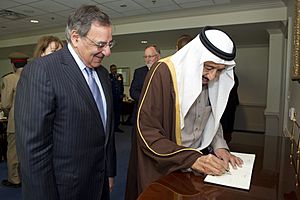
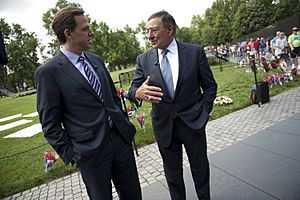
Another important issue during his time was preventing Iran from developing nuclear weapons. In January 2012, Panetta stated that developing nuclear weapons was a "red line" for Iran. He said the U.S. would consider all options to stop it. In January 2013, just before he left office, Panetta announced that women would be allowed to serve in all combat jobs in the military.
Other Activities
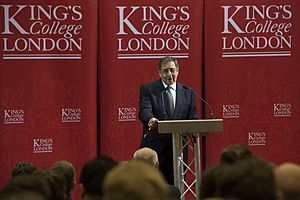
In December 1997, Panetta and his wife, Sylvia, started the Panetta Institute for Public Policy. They both served as co-directors. After Panetta became CIA director in 2009, he returned to the institute as chairman. His wife is now the co-chair and CEO. The institute is located at California State University, Monterey Bay. Panetta helped create this campus when he was a Congressman. He was even stationed at Fort Ord, the former Army base where the campus is, during his military service.
Panetta has always supported protecting the world's oceans. He helped pass laws to protect oceans, like creating the Monterey Bay National Marine Sanctuary. He also chaired the Pew Oceans Commission. He continues to work with groups like the National Marine Sanctuary Foundation and the Monterey Bay Aquarium to advocate for oceans.
In 2014, Panetta wrote his memoir called Worthy Fights. In the book, he shared stories from his long career in public service. He also discussed some disagreements he had with President Obama's policies in Syria and Iraq.
Later Career (2013–present)
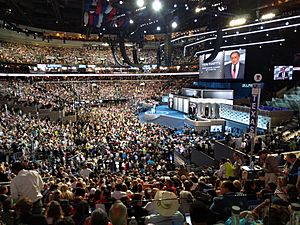
Panetta spoke at the 2016 Democratic National Convention where Hillary Clinton was nominated. He also spoke at the 2024 Democratic National Convention.
In 2020, Panetta became an advisor to the COVID-19 Technology Task Force. This group works on solutions to help with the COVID-19 pandemic. In 2021, Panetta, along with other former defense secretaries, wrote an article telling President Trump not to involve the military in the 2020 elections.
In 2021, Panetta compared the fall of Kabul to the Taliban to the failed Bay of Pigs Invasion in 1961. He suggested that President Biden should take responsibility for what happened. In 2022, Panetta joined the Council for Responsible Social Media project. This group works to address the negative effects of social media in the United States.
Other Roles and Boards
Panetta has served on the boards of many organizations and companies. These include:
- Joint Ocean Commission Initiative, Commissioner and Co-Chair
- Pew Oceans Commission, Commissioner and Chairman
- Committee for a Responsible Federal Budget, Co-Chair
- Bread for the World, Board of Directors
- National Marine Sanctuary Foundation, Board of Directors
- New York Stock Exchange, Board of Directors
- Close Up Foundation, Board of Directors
- Public Policy Institute of California, Board of Directors
- Blue Shield of California, Board of Directors
- Oracle Corporation, Board of Directors
- Beacon Global Strategies, Senior Counselor
Panetta is also part of the advisory board for the Partnership for a Secure America. This group works to find bipartisan solutions for national security and foreign policy.
Personal Life
Panetta is Catholic. He is married to Sylvia Marie Varni. She managed his local offices when he was in Congress. They live on his family's 12-acre walnut farm in Carmel Valley, California. They have three sons and six grandchildren. In 2016, their third son, Jimmy Panetta, was elected to his father's old congressional seat.
Awards and Honors
Panetta has received many awards throughout his career, including:
- 1966: Army Commendation Medal
- 1969: Abraham Lincoln Award, National Education Association
- 1988: Golden Plow Award, American Farm Bureau Federation
- 1993: Peter Burnett Award for Distinguished Public Service
- 1995: Distinguished Public Service Medal, Center for the Study of the Presidency
- 2001: John H. Chafee Coastal Stewardship Award, Coastal America
- 2012: Intrepid Freedom Award, Intrepid Sea, Air & Space Museum
- 2012: Golden Plate Award, American Academy of Achievement
- 2014: Excellence in Policy, Peter Benchley Ocean Awards
- 2015: Dwight D. Eisenhower Award, National Defense Industrial Association
- 2018: Sylvanus Thayer Award from the United States Military Academy
- 2019:
 Grand Cordon of the Order of the Rising Sun
Grand Cordon of the Order of the Rising Sun - 2023: Prize For American-Italian Relations, Center for American Studies (Rome)
- 2024: Inducted into the California Hall of Fame
Images for kids
See also
 In Spanish: Leon Panetta para niños
In Spanish: Leon Panetta para niños
 | Emma Amos |
 | Edward Mitchell Bannister |
 | Larry D. Alexander |
 | Ernie Barnes |


